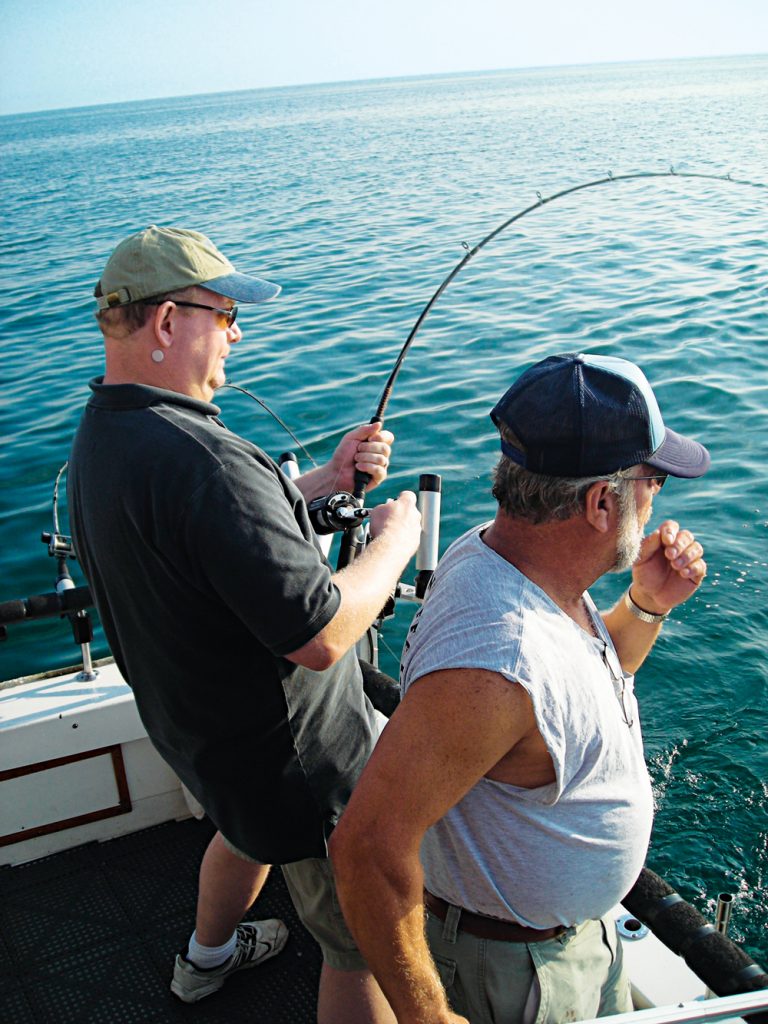September 07, 2012
By Florida Sportsman
Advice on how to prevent and treat seasickness.
By Mark Rustemier, M.D.
 Busy angler at top wears Scopolamine patch behind his ear.
Busy angler at top wears Scopolamine patch behind his ear.
Retching is the last sound you want to hear as you head offshore. Usually it means that someone onboard is seasick and your plans for the day are about to change. And if you have ever been that person with their head over the gunnels, you will never forget the experience.
Unfortunately, one of the perils of our sport is motion sickness, and most experienced fishermen have been on a boat where someone has involuntarily contributed to the chumline! Sure it makes for a few jokes, pictures and funny stories down the road, but at the time it is miserable for the victim and indirectly affects the whole crew. About a third of us are vulnerable to seasickness, but no one is immune when the seas really kick up. So it is important to understand what can be done to prevent seasickness, as well as treat it on the water, so that everyone on board can enjoy the entire outing.
Seasickness is a form of motion sickness brought on by confusion between your senses concerning movement, with your inner ear telling you one thing and your eyes another. This applies to being in a car, plane or even playing video games. Initial symptoms include dizziness, nausea, headache, increased sweating, increased yawning progressing to weakness and, yes, vomiting. This upper gastrointestinal cleanout is thought to be an evolutionary response to possible food poisoning. You may notice that an early warning sign of impending Vienna sausage regurgitation can be that your talkative fishing buddy has become quiet and less active, just before running for the stern.
Once symptoms start there are some behavioral treatments that can be done to improve the situation. It may be helpful to limit head movement, and to face forward in the direction the boat is traveling. Avoid looking down in the boat (i.e. no book reading), but instead look out over the water at a point on the horizon. Sometimes lying down, face up with a cold compress over closed eyes is helpful. Stay away from strong odors (i.e. engine fumes, old bait) and separate those “feeling sick” from others already getting sick. Nothing promotes vomiting like someone else vomiting. I fished with a guy years ago who, on one trip, when someone else on board was starting to get seasick, chose that perfect moment to offer up his can of sardines for lunch; end of story.
Sometimes the symptoms may improve on their own as the inner ear adjusts to the movement and the person gets their “sea legs,” such as on a cruise. But other times, a person really just needs to get their feet on dry land to get better.
There are medical treatments that can prevent the problem or reduce the symptoms once they have started. Over-the-counter medicines including (in adult dosages) Dramamine (dimenhydrinate), 50 to 100 milligrams every 4 to 6 hours, Antivert or Bonine brands of meclizine, 25 to 50 milligrams once daily, and Benadryl (diphenhydramine), every 4 to 6 hours, are all most effective seasickness prevention if taken one hour prior to leaving. Dramamine and Benadryl have children's dosing as well. They are all effective but can cause some drowsiness and dry mouth. Scopolamine is available by prescription in pill form, Scopace .4 to .8 milligram every 6 hours taken one hour before leaving; or in patch form, Transderm Scop, which you put on behind the ear 4 hours before going out. It can be worn for up to 3 days before changing. Scopolamine is generally the most effective, but with more side effects, including dilating your pupil if you touch the patch and then rub your eye.
Ginger as an over-the-counter supplement, taken orally, 1,000 milligrams every 6 hours, or in foods (i.e. ginger snaps) may be helpful. Several types of wrist bands that provide electrical or mechanical stimulation of an acupuncture point on the inner aspect of the wrist are claimed to help prevent or treat seasickness. There is some evidence that they may help with nausea in pregnancy or chemotherapy, but medical studies have been mixed on treating motion sickness. Whatever medical treatment you decide on using, it may be a good idea to try the medication prior to your trip, to see if the side effects are tolerable.
As with most illnesses, prevention is the key. Get adequate sleep the night before a fishing trip. Make sure you take in ample fluids, and avoid excess caffeine and alcohol prior to and during the trip as they are diuretics and contribute to dehydration. If you or someone in your group has a tendency to get motion sickness, try to go when the weather forecast is favorable. Also, keep your first aid kit updated with seasickness medications. Remember, the idea is to have an enjoyable, productive day on the water, and to avoid having anyone lying on the deck, praying for the end to come soon. FS
First Published Florida Sportsman January 2008

